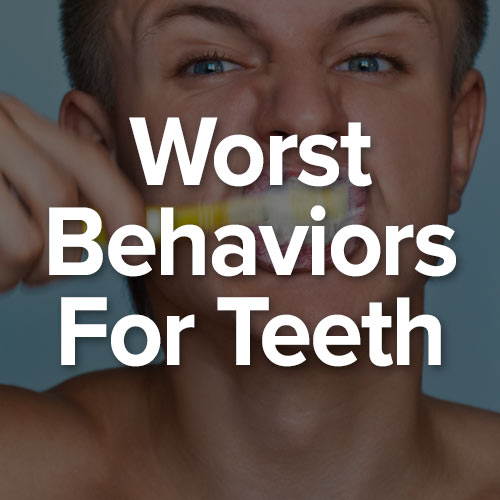10 Worst Behaviors For Teeth

You brush and floss regularly and see us
twice a year for professional cleanings and checkups. Good for you!
Diligent oral hygiene is the cornerstone of a healthy smile. But for all
your positive effort, you may be doing other things in your daily life
that are putting your pearly whites’welfare at risk!
Here are 10 behaviors that can cause either immediate damage to your
teeth (like chipping and cracking) or damage over time (like erosion of
the tooth’s protective enamel coating or gum recession).
Using the Wrong Toothbrush
Using a brush that’s too hard can cause your gums to recede and
abrasion damage to tooth root surfaces. A soft-bristled, multi-tufted
brush is ideal.
Brushing Too Forcefully and Frequently
Even with the right brush, you can still damage teeth and irritate
gyms by applying it too forcefully. A gentle whisking is all that’s
needed to break up bacterial plaque buildup on tooth surfaces. Ask us about the proper technique if you’re not sure.
Brushing too often can also be damaging over time. Twice a day — morning and night — is sufficient.
And, brushing immediately after eating can erode tooth enamel, which
is weakened by acidity in foods and beverages. Wait at least 30 minutes.
Nail Biting
This nervous habit exerts “parafunctional” (outside what’s normal)
bite forces that can wear down teeth and cause small fractures and
chips.
Grinding and Clenching
Bruxing, the dental term for tooth grinding as well as jaw clenching,
exerts excessive bite forces that can result in tooth wear, fractures
or looseness, jaw pain and other symptoms. It often occurs while people
sleep; a night guard can help protect against damage.
Chewing Ice Cubes
Some blenders have special blades to crunch through ice cubes;
imagine the effect of doing the same thing with your teeth! The force it
takes your teeth (and jaws) to crunch through frozen water is far
beyond what they’re designed to withstand.
Using Your Teeth as Tools
Teeth are designed for eating, not for tearing tags off clothing,
ripping open a bag or unscrewing bottle tops. Misusing them
is a recipe for fractures, chips and cracks.
Playing Contact Sports Without a Mouth Guard
Mouth guards are an important piece of athletic equipment that can
protect your teeth from blows to the face and head and reduce the risk
of broken or lost teeth, cut lips and other damage.
Dry Mouth
Saliva is important to oral health, as it neutralizes enamel-damaging
acidity in your mouth and contains minerals that strengthen enamel. Dry
mouth increases your risk of enamel erosion, cavities, and bad breath.
Sugary Foods and Beverages
Sugary foods and drinks increase the risk of tooth decay. Sugar and
carbohydrates (which break down into sugar) are favorite snacks for
certain oral bacteria, which produce cavity-causing acid as they digest.
Serial Coffee or Soda Drinking
Coffee and soda — regular and diet — are highly acidic. Sipping them
throughout the day bathes your teeth in damaging acidity and doesn’t
give saliva a chance to neutralize it.
To book an appointment with us
Call us at: +912240147049
iDent, Idyll Dental Clinic
Email: smileident@gmail.com
Website: www.smileident.com

 You brush and floss regularly and see us
twice a year for professional cleanings and checkups. Good for you!
Diligent oral hygiene is the cornerstone of a healthy smile. But for all
your positive effort, you may be doing other things in your daily life
that are putting your pearly whites’welfare at risk!
You brush and floss regularly and see us
twice a year for professional cleanings and checkups. Good for you!
Diligent oral hygiene is the cornerstone of a healthy smile. But for all
your positive effort, you may be doing other things in your daily life
that are putting your pearly whites’welfare at risk!



